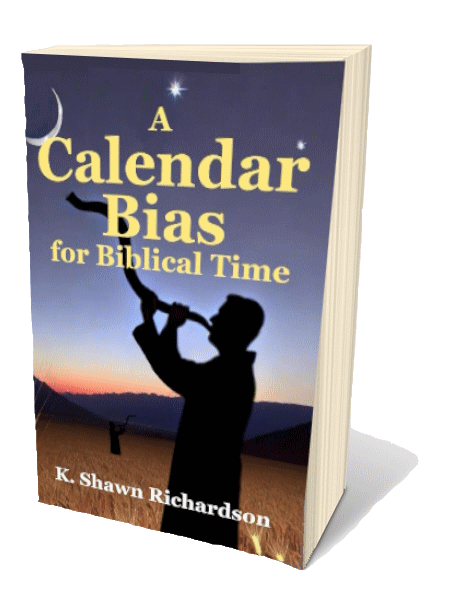
The book critically evaluates the role of observation in determining scriptural dates, as ordained by Biblical signs, compared to humanity's tendency to favor calculated averages and man-made traditions using algorithmic calendrical systems. It also offers an in-depth analysis of the historical context and accuracy of today’s Hebrew Calendar, questioning the authority behind its construction and continued usage.
What is covered:
- The concept of "calendar bias" and its historical implications.
- Alignment of human calendars with celestial observations (sun, moon, and stars).
- The role of biblical references and traditions in timekeeping systems.
- Scientific observations and their influence on modern calendars.
- Challenges of synchronizing natural celestial cycles with human-made time structures.
- The evolution of lunar, solar, and lunisolar calendars.
- Cultural and theological significance of calendar systems in ancient civilizations.
- The interplay between spiritual observances and astronomical phenomena.
- Analysis of discrepancies in historical and contemporary timekeeping.
- Tools and methodologies for observing celestial synchronicity.
Rediscovering God's Timekeeping: Observing the Biblical Calendar
This book delves deeply into the concept of observing the sun, moon, and stars to determine the Biblical calendar, demonstrating how these celestial signs align with God's intended design for timekeeping. It explores the challenges introduced by relying on human-devised systems, such as the Hebrew calendar's mathematical rules or modern timekeeping's artificial adjustments like Daylight Savings Time. Through careful examination of scripture and historical practices, the book advocates for a return to observation as a method that honors the simplicity and universality of God's creation. By aligning with natural phenomena rather than man-made constructs, believers can ensure that their observance of appointed times is accurate and faithful to Biblical principles.
For those seeking to deepen their understanding of God's appointed times and the principles behind the Biblical calendar, this book offers invaluable insights. It presents a compelling case for relying on observation as a more accurate and spiritually grounded approach, supported by scripture and historical evidence. Readers are encouraged to consider how their current methods of timekeeping may inadvertently reflect biases toward human traditions, and how embracing God's observable timepiece can lead to a more authentic walk of faith. This journey of rediscovery promises not only to enrich one's understanding of the Biblical calendar but also to strengthen their relationship with the Creator.
Chapters:
- Calendar Bias: Explores how human-designed timekeeping systems have influenced perceptions of the Biblical calendar and challenges readers to return to God's original design.
- God's Ordained Signs: Examines the role of the sun, moon, and stars as divinely ordained markers for determining time and aligning with God's appointed times.
- Biblical Days: Provides an in-depth look at how a day is defined in the Bible, focusing on the transition from evening to morning and the implications for timekeeping.
- Biblical Months: Discusses the significance of the lunar cycle in establishing Biblical months and its role in determining appointed times.
- Biblical Years: Analyzes the use of seasonal markers, such as aviv barley, in defining the start of Biblical years and their spiritual importance.
- Biblical Weeks: Highlights the Biblical understanding of a week, with a focus on the Sabbath as a sign of God's covenant and a key element of the divine calendar.
- Times and Seasons: Explores the broader framework of "times and seasons" in scripture, emphasizing their prophetic and practical applications.
- Historical Sanhedrin: Reviews the role of the Sanhedrin in managing the Biblical calendar historically and its impact on timekeeping practices.
- Current Hebrew Calendar: Examines the development and structure of the modern Hebrew calendar, comparing it with Biblical principles and observable phenomena.
- Accuracy: Investigates the mathematical and observational accuracy of various calendar systems, emphasizing alignment with Biblical instructions.
- Authority: Discusses the question of who holds authority over determining the calendar, contrasting scriptural guidance with human traditions.
- What Would Jesus Do?: Reflects on how Jesus Christ observed time and festivals, providing a model for modern believers to follow.
- Today's Observational Calendars: Reviews modern approaches to observational calendars, including their strengths and weaknesses compared to Biblical practices.
- Unity Versus Uniformity: Explores the balance between fostering unity among believers and avoiding rigid uniformity in calendar observance, promoting liberty in love.
Help Support an Observational Calendar
Proceeds from this book help support RenewedMoon.com, a platform dedicated to providing eyewitness reports of monthly new crescent moon sightings and annual aviv barley reports, which are vital for determining the Biblical calendar. RenewedMoon.com fosters communication among the body of believers by inviting community participation in submitting sightings and sharing updates from global and Israel-based perspectives. Through these efforts, the site promotes education on the observational calendar, aligning with God's ordained celestial signs as outlined in scripture, and enhances understanding of His Festival Days, enabling individuals to observe these appointed times with greater accuracy and faithfulness.


